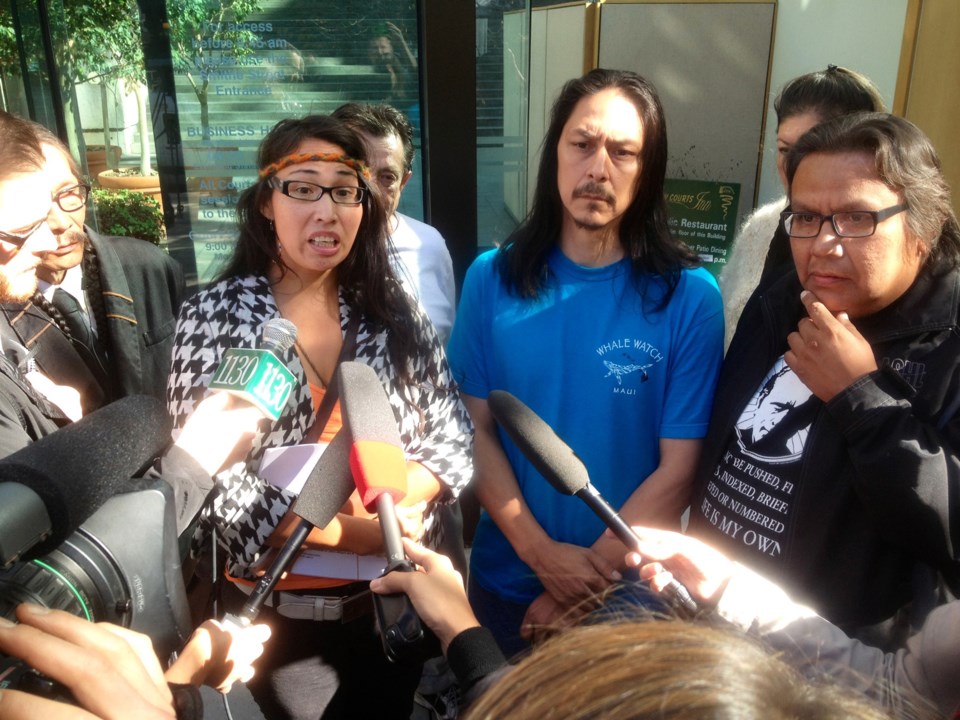Campers at the Oppenheimer Park tent city have been given two deadlines over the next two days to remove fuel sources such as propane tanks to prevent fires and to take down tarps strung between tents.
Madam Justice Jennifer Duncan granted the interim order Tuesday in B.C. Supreme Court after pointing out fire hazards at the camp identified by assistant fire chief Joe Foster in a court affidavit.
Duncan imposed the order after she adjourned the Vancouver Park Board’s request for an injunction to dismantle the tent city. She did this to give lawyers acting on behalf of campers and organizers of the tent city more time to prepare arguments for what’s expected to be a two-day hearing beginning Oct. 6.
For now, campers must comply with Duncan's order which essentially reactivates an earlier order the fire department posted at the park July 29, some two weeks after campers began moving into Oppenheimer at Jackson and Powell streets. Campers never complied with the first order.
Duncan’s order means campers must now remove all open flame or flammable heat sources, smoking materials from temporary structures and tents, as well as propane or other fuel sources on the site by 7 p.m. Tuesday.
Also, Duncan has given the campers until 7 p.m. Wednesday to remove all tarps strung between tents. The concern from the fire department is the tarps block access in case of a fire or medical aid call. Tarps that cover tents to keep out the rain can stay as long as they don’t protrude more than three inches from the tent.
One of the issues for organizers of the tent city was not being able to light a “sacred fire” that was extinguished five days ago because of a dispute in the camp. Audrey Siegl, one of the founders of the tent city, told the court of the importance of the fire, which she said was “a source of comfort and spiritual healing.”
Many of the campers are First Nations, although Siegl, a member of the Musqueam Indian Band, has a home. She does not speak on behalf of the band. Seigl told reporters after Tuesday’s court proceedings the “sacred fire” would be re-lit Tuesday night. Duncan didn’t rule on the “sacred fire”, leaving it to organizers of the camp and the fire chief to work out.
Dan Wallace, another founder of the tent city, said the core group at the park has always agreed to work with the fire service and police department over concerns about camp, which has more than 200 tents pitched in the block-long park. But Wallace pointed out that he and others had several meetings with emergency personnel leading up to the court action. He said he didn’t think the park board’s request for an injunction was necessary.
"The city has taken their position saying that there’s no actual central leadership, the camp is in complete chaos, well no, it’s not the truth," Wallace told reporters. "The camp is actually coming together and gelling together a lot more."
In Foster’s affidavit, he wrote that on Sept. 3 he observed campers pull a sleeping man from “a makeshift tepee structure” that was on fire. Foster said flame from a candle spread to cardboard and wood inside the structure. The man left the camp before he could be identified.
Other observations made by Foster include:
· Many fights.
· A man “wildly swinging a long, two-inch thick metal pipe around in a menacing manner.”
· Many tenants with buckets of urine and feces.
· Rats in and around tents.
· Infestation of bed bugs in a mattress removed from the park. Park board truck had to be fumigated.
· Numerous needles in and around tents.
· Unconscious people in the park difficult to wake up when checked for own health and safety.
· At least three “bike shops” set up under multiple tents. The bikes are taken apart, repainted with aerosol paint cans and reassembled.
Outside the court, Pivot lawyer DJ Larkin, who is representing three of the campers, said it will be “very challenging” for campers to comply with Duncan’s orders to remove fuel sources and take down some of the tarps.
“There’s quite a lot set up in the park right now and it doesn’t necessarily mean that everyone will be at the camp right now able to take the tarps down,” Larkin said. “My hope is that the leadership of the camp will be able to work with the fire department and VPD to make this happen smoothly. What we’re worried about is that people will see tarps coming down and think that they’re being enforced against and that the camp is coming down and that that will raise tensions in the park.”
The camp was set up in July to protest the lack of adequate housing in the city for low-income and homeless people. The city and B.C. Housing have worked with campers to move some of them into shelters and housing.The city announced last week that it reached a deal to open 157 units of temporary housing in the former Quality Inn at 1135 Howe St. that will open in November. Also, the city created another 70 shelter spots by transforming the former Kettle of Fish restaurant on Pacific Street into a shelter and finding space at the Union Gospel Mission.
Over the past nine weeks, the city said, 40 homeless campers were moved into housing. A further 50 people remain on the wait list for housing and upwards of 50 more may also be homeless at the park, the city said. As of Sunday, Larkin said, at least 20 more campers from the park have moved in to the former Kettle of Fish building near the north end of the Burrard Bridge.
twitter.com/Howellings



